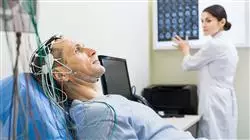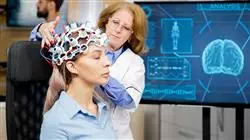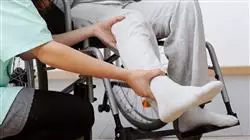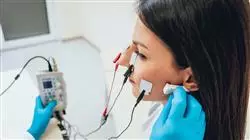University certificate
The world's largest faculty of nursing”
Description
You will learn to define the specific care in mobility disorders, epilepsy and demyelinating diseases, in such a way that the theoretical knowledge is integrated in order to be able to perform a suitable practical assessment "

This program addresses the management of one of the most common neurological diseases. Its prevalence in Europe is 0.7%, affecting in Spain between 300,000-400,000 inhabitants according to the SEN (Spanish Society of Neurology). As such, the curriculum covers the classification, symptomatology and possible causes of epilepsy, as well as the classification of epileptic seizures. This is a disease that, if not controlled, causes a great loss of autonomy.
In recent years, new antiepileptic drugs have appeared that have the same ability to control seizures, but with fewer side effects. These treatments will be described in thispostgraduate diploma, as well as other different surgical procedures in drug-resistant patients, which greatly reduce the percentage of crises. The use of video EEG diagnosis will be observed which in some cases makes it possible to locate the epileptogenic focus and suppress it with surgery, reducing seizures by 80%.
Similarly, this program will define the various neurological pathologies related to mobility disorders, focusing on Parkinson's disease and other similar diseases. For example, Parkinson's disease is the second most common degenerative disease of the nervous system. In Spain it affects about 80,000 inhabitants. The patients are highly dependent as they present tremors and serious problems in walking, causing falls with the complications they entail and reaching the end of the disease with almost total immobility of the patient. Therefore, it is necessary to understand the scope of the latest advances in treatments, both pharmacological and surgical, which have led to an improvement in the quality of life of these patients and the importance of nursing in the application of this care and in the follow-up of the patients.
On the other hand, the different demyelinating pathologies are studied and reviewed, especially multiple sclerosis, since they are the leading cause of non-traumatic disability in young adults, causing physical and cognitive disability, with a high impact on quality of life. According to the SEN (Spanish Neurology Society), by 2020 there will be more than 50,000 people affected by multiple sclerosis. It has progressively increased in the last decades, especially affecting women.
Parkinson's disease is the second most common degenerative disease of the nervous system, so get specialized and improve your quality of life"
This postgraduate diploma in Multiple Sclerosis, Epilepsy and Mobility Disorders for Nursing contains the most complete and up-to-date program on the market. The most important features of the program include:
- Development of more than 100 case studies presented by experts in neurological nursing. Its graphic, schematic and eminently practical contents, which are designed to provide essential scientific and assistance information for professional practice
- Latest developments in neurological nursing
- Contains practical exercises
- Theoretical lessons, questions to the experts and clinical cases for individual reflection
- Content that is accessible from any fixed or portable device with an Internet connection
- Multimedia content developed with the latest educational technology, which will allow the professional a situated and contextual learning, that is, a simulated environment that will provide an immersive learning programmed to train in real situations.
Having nurses who are experts in the advanced practice of different mobility disorders is in demand in hospitals, as well as a plus for your professional career"
The program’s teaching staff includes professionals from the sector who contribute their work experience to this training program, as well as renowned specialists from leading societies and prestigious universities.
The multimedia content, developed with the latest educational technology, will provide the professional with situated and contextual learning, i.e., a simulated environment that will provide immersive training programmed to train in real situations.
This program is designed around Problem-Based Learning, whereby the professional must try to solve the different professional practice situations that arise during the academic year. For this purpose, the professional will be assisted by an innovative interactive video system created by renowned and experienced experts.
Expand your knowledge of the classification and etiopathogenesis of epilepsy and become a nurse specialized in this increasingly common pathology”

You will update your knowledge in demyelinating diseases and delve into CNS autoimmune diseases thanks to TECH”
Objectives
The postgraduate diploma in Multiple Sclerosis, Epilepsy and Mobility Disorders for Nursing is oriented to facilitate the performance of nursing staff dedicated to the treatment and care of patients with Mobility Disorders such as Multiple Sclerosis or Parkinson's, as well as to know how to control episodes of Epilepsy. This requires a high level of competence and training to avoid possible complications and improve the level of self-care. In this way, the nurse will be trained in the treatment required by patients in this area, with rigor and professionalism, in order to achieve the following proposed objectives, distributed in general and specific by module, for greater satisfaction of the future graduate on the way to his or her professional goal.

You will successfully integrate the nursing care required into your daily practice following standardized care plans according to nursing taxonomies"
General Objectives
- Learn and integrate general nursing care in the main neurological pathologies
Perform standardized care plans, acquiring knowledge on how to perform nursing assessments according to functional patterns and use NANDA-NIC-NOC nursing taxonomy for care planning and evaluation - Acquire knowledge and fundamentals of the pathophysiology of cerebrovascular diseases, epilepsy, movement disorders, multiple sclerosis, dementia, headache, neuromuscular diseases, neurological oncology and CNS infectious diseases and integrate them into nursing practice
- Understand the Necessary Knowledge in Physiopathology of Neurological Diseases
- Have an In-depth Knowledge of the Most Up-to-date Basic Medical-Surgical Treatments
- In-depth knowledge of diagnostic taxonomy to formulate nursing diagnoses, outcome criteria and nursing interventions
Specific Objectives
Module 1. Epilepsy
- Know and expand knowledge about the classification and etiopathogenesis of epilepsy
- Provide and expand knowledge in diagnostic tests
- Know in depth the specific nursing care involved in epilepsy
- Integrate nursing care into daily practice by following standardized care plans according to nursing taxonomies
Module 2. Mobility Disorders
- Know and broaden knowledge in etiopathogenesis of mobility disorders
- Expand knowledge in parkinsonisms
- Study knowledge of dystonia, Tourette’s syndrome and Huntington’s syndrome.
- Know in depth the specific nursing care of mobility disorders diseases
- Integrate nursing care into daily practice by following standardized care plans according to nursing taxonomies
Module 3. Multiple Sclerosis and Autoimmune CNS Diseases
- Know and expand knowledge in etiopathogenesis of multiple sclerosis
- Updated knowledge of demyelinating diseases
- Study content about autoimmune diseases snc
- Have an in-depth knowledge of the specific nursing care of demyelinating diseases
- Integrate nursing care into daily practice by following standardized care plans according to nursing taxonomies

Update your knowledge in parkinsonisms and study dystonia, Tourette's syndrome and Huntington's syndrome in depth with a team of professionals with great experience in the treatment of these patients"
Postgraduate Diploma in Multiple Sclerosis, Epilepsy and Movement Disorders for Nursing
Multiple Sclerosis, Epilepsy and Movement Disorders are chronic diseases of the nervous system that affect millions of people worldwide. These pathologies can have a significant impact on patients' quality of life, and require ongoing treatment to improve their prognosis. As a nurse, it is essential to keep up to date on the latest care that allows you to provide the best possible care to patients. That's why the University Course in Multiple Sclerosis, Epilepsy and Movement Disorders for Nurses is an ideal choice to update your knowledge in this field and put you at the forefront of your sector.
Study 100% online and without leaving your home
Learn, through the Postgraduate Diploma in Multiple Sclerosis, Epilepsy and Movement Disorders for Nursing, the updated protocols to improve the care and attention of patients with these pathologies. It is, therefore, a unique opportunity to ensure a rigorous and complete update, enjoying a 100% online learning that will allow you to perfectly combine your academic life with your personal and professional obligations.







